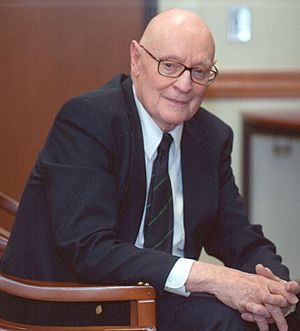Nicholas Rescher facts for kids
Quick facts for kids
Nicholas Rescher
|
|
|---|---|
 |
|
| Born | 15 July 1928 |
| Died | 5 January 2024 (aged 95) Pittsburgh, Pennsylvania, U.S.
|
| Nationality | United States |
| Alma mater | Queens College (CUNY) Princeton University |
| Era | Contemporary philosophy |
| Region | Western philosophy |
| School | Analytic Process philosophy Methodological pragmatism Pragmatic idealism Epistemic coherentism Coherence theory of truth |
| Institutions | University of Pittsburgh |
| Thesis | Leibniz' cosmology: a reinterpretation of the philosophy of Leibniz in the light of his physical theories (1951) |
| Doctoral advisor | Alonzo Church, Ledger Wood |
| Doctoral students | Alexander Pruss Ernest Sosa |
|
Main interests
|
Philosophy of subjectivity, history of philosophy, epistemology, value theory |
|
Notable ideas
|
Philosophical theory of everything, axiogenesis |
|
Influenced
|
|
Nicholas Rescher (born 15 July 1928 – died 5 January 2024) was a famous German-born American philosopher and author. He was a professor of philosophy at the University of Pittsburgh starting in 1961.
Rescher was a very important person in the world of philosophy. He led the Center for Philosophy of Science and was the head of the philosophy department at his university. He also served as president for several major philosophical groups, like the American Philosophical Association. He even started three important philosophy journals: American Philosophical Quarterly, History of Philosophy Quarterly, and Public Affairs Quarterly. He passed away in 2024 at the age of 95.
Contents
Early Life and Education
Nicholas Rescher was born in Hagen, Germany. When he was 10 years old, his family moved to the United States. He became a US citizen in 1944.
He studied mathematics at Queens College, New York, and then went to Princeton University. In 1951, at just 22 years old, he earned his Ph.D. in philosophy. He was the youngest person to ever get a Ph.D. from that department!
After college, he served in the United States Marine Corps from 1952 to 1954 during the Korean War. Then, he worked for the Rand Corporation, a research organization, for three years. In 1961, he began teaching philosophy at the University of Pittsburgh, where he stayed for the rest of his career.
A Busy Career in Philosophy
Nicholas Rescher started his teaching career at Princeton University in 1951. He moved to the University of Pittsburgh in 1961. The next year, he became the first associate director of their new Center for Philosophy of Science.
In 1964, he started the American Philosophical Quarterly, a major journal for philosophers. He also led the philosophy department from 1980 to 1981. Rescher was known for writing a lot of books and articles—over 100 books and 400 articles! Some people even joked that "Rescher" wasn't one person, but a whole team.
He was also a member of many important groups, including the American Academy of Arts and Sciences and the Royal Society of Canada.
Awards and Recognition
Nicholas Rescher received many awards for his important work. In 1984, he won the Humboldt Prize for Humanistic Scholarship. This is a very respected award for people who study human culture and thought.
He also received the Cardinal Mercier Prize in 2005 and the Aquinas Medal in 2007. In 2011, Germany honored him with the premier cross of the Order of Merit of the Federal Republic of Germany. This award recognized his contributions as a German-American philosopher. He also received eight honorary degrees from different universities.
A professor named Nadia Maftouni praised Rescher's book, A Journey through Philosophy in 101 Anecdotes. She said it's easy to write in a complicated way, but hard to write simply and clearly. Rescher was good at making complex ideas understandable.
The Nicholas Rescher Prize
In 2010, the University of Pittsburgh created a special award in his honor: the Nicholas Rescher Prize for Contributions to Systematic Philosophy. This prize celebrates philosophers who create complete and organized systems of ideas.
The first person to receive this prize was Ernest Sosa, who was one of Rescher's former students. The award includes a gold medal and a large sum of money. Other famous philosophers like Alvin Plantinga and Hilary Putnam have also received this honor. Later, the University of Pittsburgh's award was renamed the Rescher Medal when the American Philosophical Association started its own Rescher Prize.
See also
 In Spanish: Nicholas Rescher para niños
In Spanish: Nicholas Rescher para niños
 | Precious Adams |
 | Lauren Anderson |
 | Janet Collins |

